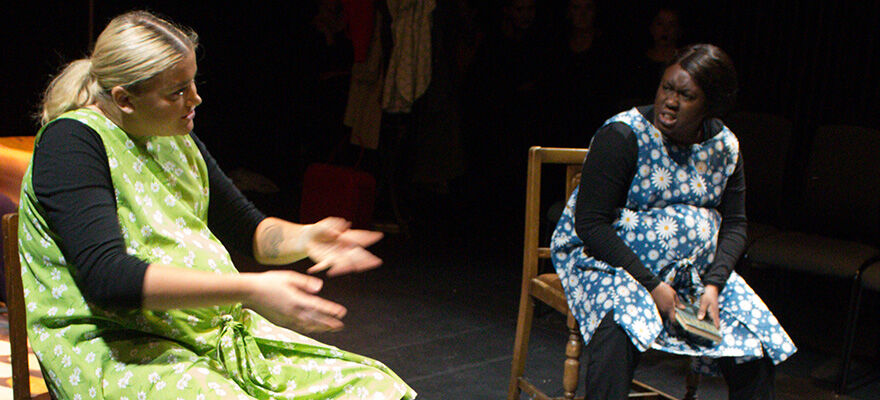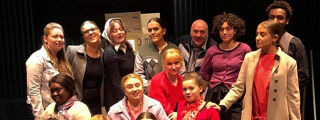My name is Elena Yianni and I am studying for a degree in Applied Theatre at Royal Birmingham Conservatoire. At the end of our first year, in collaboration with the rest of my year group, I was involved in devising a piece of original theatre which we staged to an audience in the Lab space at the Conservatoire.
An applied theatre performance differs from other theatrical productions as it requires those involved to have an interactive approach during the production process, and to thoroughly research into the topic chosen to explore. For our final project at the end of first year our brief was to devise and perform an original piece of theatre, the piece we created was called ‘Lifting the Lid’.
We began the development process in January, when we visited and interviewed the elderly residents at Middleton Road Sheltered Housing in Kings Heath on a number of occasions. This was a valuable opportunity and we were all moved with their stories of Birmingham in the 1950s. These visits to Middleton Road were followed by many discussions in which we immersed ourselves in 1950s Birmingham, and thoroughly researched the period of time; discovering issues of racism, sexism, high-society standards, post-war tension and the impact of the Windrush scandal. During the early production stages, there were plenty of opportunities to share research and hold discussions and improvisation. We eventually narrowed down to the specific scenario we wished to explore; then came many rehearsals.
One of the highlights of the process was when we had the privilege of working with professional Lindy Hop dancers, who taught us some basic steps and turns that were popular with people during the 50s. As a group we also learned the hymn ‘Washed in the Blood’ which we performed a cappella during one of the scenes in the play.
The story behind ‘Lifting the Lid’ was about a woman called Peggy in her eighties who has just moved in with her daughter and granddaughter. Due to old age, she is very forgetful, yet when she stumbles upon an old box of items, all her memories come flooding back. As the audience are sent back to the 1950s, Peggy watches in the modern day, reminiscing about her teenage years with tears, laughter and surprise. Peggy’s story seems fairly commonplace at first; she falls in love with an irresistible young handsome gentleman - however, Peggy is white, and the audience learns the man she’s dating is black. In those days it was seen as shameful by Peggy’s community to ‘court a black man’. Peggy decides the best thing to do is end the romance, only to find out she’s pregnant.

Forced by her parents and society, Peggy has no choice but to give up her baby. Her journey was rocky, she was lied to and mistreated, and ultimately left with a broken heart that could never heal. The play tells Peggy’s story, touching on the events that contribute to such tragic repercussions on the rest of her life. At the end of the play, it all becomes too much for Peggy and she’s seen panicking and dropping the box of memories. When her granddaughter walks in, in an attempt to help she begins to pick up all the stuff that fell out of the box, she says “Who’s this Nan, and what are all these letters?”.
This was a production performed in traverse that touched upon situations from many people’s lives in the 1950’s. We heard stories from real people where their unconditional love for someone was unacceptable to the rest of society, and ultimately they were forced apart and lives were ruined. In the case of our story, Peggy was forced to give away her miracle, their baby, and expected to suffer the consequences. From the process of developing this piece I learnt so much. In the words of someone who watched the play, “It’s nice to think of the elderly, as we seem to forget they had lives”. In other words, sometimes the elderly community are overlooked, but I think it’s time we really sat down and listened to their stories as they have so much to say:
"Listen to your elders’ advice, not because they are always right, but because they have more experience of being wrong."





